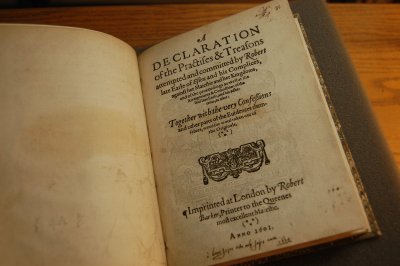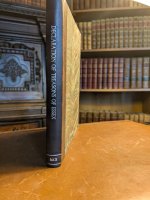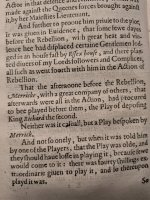The Alta Collection
BACON, Sir Francis (1561-1626)
A Declaration (1601)
$3500
Item Details
London, 1601
Titlepage: A Declaration of the Practises & Treasons attempted and committed by Robert late Earle of Essex and his Complices, against her Majestie and her Kingdoms, and of the proceedings as well at the Arraignments & Convictions of the said late Earle, and his adherents … Together with the very Confessions and other parts of the Evidences themselves, word for word taken out of the Originals. Imprinted at London by Robert Barker, Printer to the Queenes most excellent Majestie. Anno 1601.
References: STC (2nd ed.) 1133; ESTC S100347; Pforzheimer 26.
Format: Quarto. First Edition. Recent quarter calf over marbled boards. Lacking signature E, but signature F is duplicated.
Description: A public declaration of Bacon’s condemnation of Robert Devereux, Earl of Essex and his failed attempt to overthrow Queen Elizabeth I following his humiliation in Ireland. Bacon’s own text (A3–K3) on Essex and the particulars of the abortive insurrection is followed (K4–Q4) by the "voluntary confessions" of his fourteen supposed closest allies and five others, taken before and during the trial and concluding with two (dated 21 and 25 February) by Essex himself, who was convicted and quickly executed in the Tower on the 25th. But for many readers the most provocative detail falls at the end of the first part (K2v–K3r), where Bacon gives a vivid account of a kind of "rally" arranged by the would-be rebels on the eve of their fruitless march on the City.
Sir Gelly Meyrick visited the Globe Theatre with a party of conspirators and negotiated with Augustine Phillips of the Lord Chamberlain’s Men, Shakespeare’s own acting company, to perform the suggestive tragedy of Richard II, "the Play of deposing King Richard the second," on that Saturday, when members of Essex’s inner circle attended, hoping to inspire support from the citizenry for the next day’s campaign.
This is the earliest specific reference in print to the theatrical staging of any Shakespeare play.
The relevant substance of Shakespeare’s play was of course the overthrow and subsequent death of a weak monarch, ousted by the vigorous usurper Henry IV (Bolingbroke), and the voluntary abdication of the former – in a famous scene (4.1.154–315) played onstage as early as 1597, but withheld from print until the fourth quarto of 1608. Phillips objected, like the company man he was, that "the Play was olde, and they should have losse in playing it, because fewe would come to it," but was appeased by a promised subsidy of "fourty shillings extraordinarie given to play it, and so thereupon playd it was." "Neither was it casuall," Bacon adds, "but a Play bespoken by Merrick." Phillips was later interrogated about the Company’s role in this abrupt change in their choice of entertainment but satisfied the authorities that they had known nothing of its dark purpose.
The authorities claimed that Meyrick was responsible for paying the players 40 shillings for reprising Richard II and he was imprisoned in Newgate. On 5 March he was tried at Westminster Hall and charged with rebellion on the grounds that he had fortified Essex House against the queen's forces, provided munitions for the earl's men, and helped to arrange the performance of the play. He made little effort to defend himself: "I must die and not unwillingly; for the tree being fallen, the branches must not stand." Meyrick was hanged, drawn, and quartered at Tyburn on 13 March 1601.
The parallel between the ineffective Richard II and the septuagenarian Elizabeth was not lost on the Queen herself: in August of the same year, she received from the antiquary William Lambarde a copy of his Pandecta of historical documents in the Tower, and "fell upon the reign of Richard II, saying 'I am Richard II, know you not that?'" She also observed, without specifying when, that "this tragedy was played 40tie times in open streets and houses," and that she possessed a printed portrait of Richard among her own papers.
Catalogue description by Arthur Freeman
The Alta Collection
Eric Rasmussen
1004 Placid Creek Ct
Round Rock, TX, 78665
United States
Phone: 9252124132
Featured Catalogue
Visit Website
Specialities
Shakespeare, Early English Books, Manuscripts
More Information
Booth 5
Shipping and Returns
2-day FedEx, USPS, or UPS shipping


